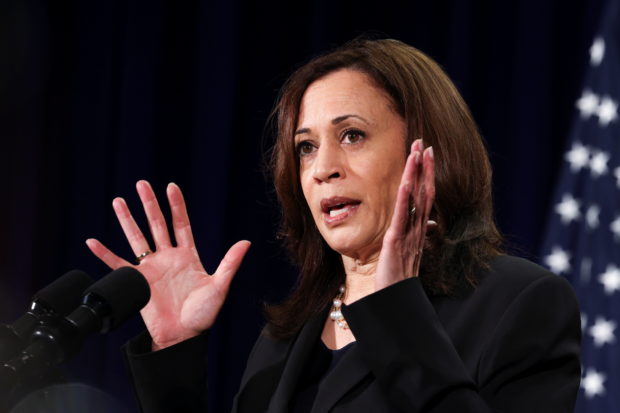Kamala Harris says US will ‘speak up’ on South China Sea

U.S. Vice President Kamala Harris holds a news conference before departing Vietnam for the United States following her first official visit to Asia, in Hanoi, Vietnam, August 26, 2021. REUTERS
HANOI — The United States welcomes competition and does not seek conflict with Beijing, but will speak up on issues like maritime disputes in the South China Sea, Vice President Kamala Harris said on Thursday as she concluded a trip to Southeast Asia.
In visits to Singapore and Vietnam, Harris charged China with bullying its Southeast Asian neighbors, triggering sharp rebukes from Beijing, which accused the U.S. of meddling in regional affairs and disrupting peace.
“We welcome stiff competition, we do not seek conflict, but on issues such as the South China Sea, we are going to speak up,” Harris told a news conference in Vietnam’s capital, Hanoi.
“We are going to speak up when there are actions that Beijing takes that threaten the rules-based international order,” she added.
Harris’s seven-day trip to Singapore and Vietnam is part of a broader U.S. strategy to take on China globally.
China, Vietnam, Brunei, Malaysia, the Philippines and Taiwan lay claim to parts of the disputed waters of the South China Sea, which is crossed by vital shipping lanes and contains gas fields and rich fishing grounds.
In meetings with Vietnamese leaders on Wednesday, Harris said China’s “bullying and excessive maritime claims” in the South China Sea should be challenged, and offered U.S. support to enhance Vietnam’s maritime security, including more visits by U.S. warships to the country.
Her statements drew condemnation from Chinese state media.
On Wednesday, the state run China Daily, responding to Harris’ comments in Singapore, said Harris had “willfully ignored her own hypocrisy” in attempting to rally countries in the region against China.
On Thursday, after her meetings in Hanoi, the Global Times said the U.S. was “dreaming” to incite Vietnam to confront China.
“For Washington, it couldn’t be better if a new war between Beijing and Hanoi breaks out,” the tabloid, published by the official newspaper of China’s ruling Communist Party, said in an editorial.
The U.S. administration has called rivalry with China “the biggest geopolitical test” of the century as it cements its pivot towards Asia.
Southeast Asia has seen a series of high-profile visits by top administration officials, including Secretary of Defense Lloyd Austin, who visited Hanoi in late July.
RELATED STORIES
Kamala Harris says China intimidates to back South China Sea claims